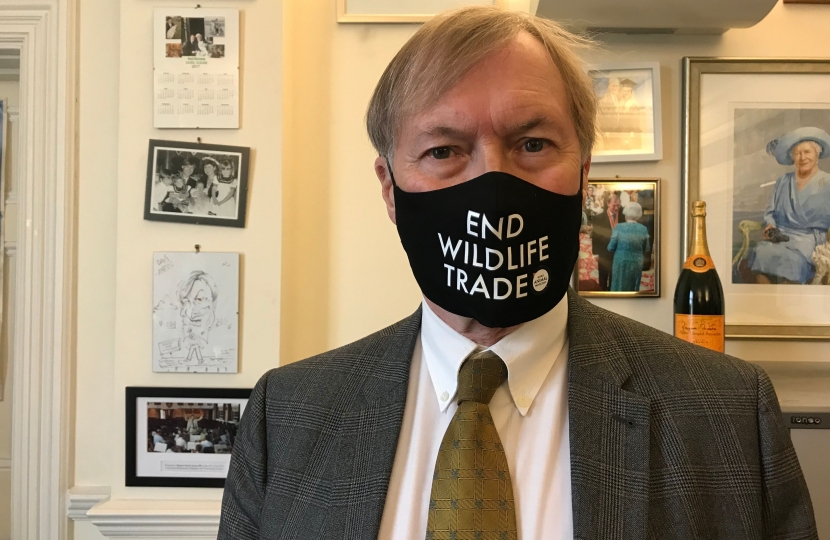
On Thursday 5 November, Sir David Amess, MP for Southend West, spoke in the online Parliamentary event organised by World Animal Protection to end the global wildlife trade. Sir David called for the global wildlife trade to be banned and for the G20 leaders to take decisive action to prevent future zoonotic pandemics.
World Animal Protection are spearheading the Campaign to End Wildlife Trade, a coalition of 25 of the UK’s leading animal welfare and wildlife conservation groups, including the Conservative Animal Welfare Foundation, Compassion in World Farming, Four Paws UK and Cruelty Free International. Sir David recently tabled an Early Day Motion entitled ‘The global wildlife trade and prevention of future zoonotic pandemics’.
Sir David said “Last month I tabled an EDM entitled ‘The global wildlife trade and prevention of future zoonotic pandemics’ which has been signed by Members across the political spectrum. Even though not all Members agree with each other politically, it is reassuring to see that many Members from a range of parties do agree on the importance of protecting and caring for animals and stopping the global wildlife trade.
As a patron of the Conservative Animal Welfare Foundation, I am pleased that the charity is working with the World Animal Protection and has formed the Campaign to End Wildlife Trade with 23 other leading animal welfare groups.
Britain is known to be a nation of animal lovers, but the problem of selling animals or animal products isn’t just a country specific one, it spans across continents – it is a global problem. The global trade of wild animals is cruel, unsustainable and puts our health and the world economy at risk. The income generated from the commercial wildlife trade doesn’t compare to the economic costs of loss of biodiversity and zoonotic diseases, as we are currently experiencing with Covid-19, and therefore ending the global wildlife trade is an investment in the future.
The global wildlife trade has many negative impacts on our ecosystems and our health. It massively decreases biodiversity, it causes harm to the animals which we share this planet with and it increases the risk of future pandemics and zoonotic diseases.
The second-biggest direct threat to species’ survival, after habitat destruction, is wildlife trade. The global wildlife trade can massively reduce biodiversity and cause animals to become endangered and even extinct. Tigers, rhinoceroses and elephants have suffered particularly hard from the sale of their skin, bones and tusks. The loss of biodiversity causes serious issues for the complex web of life. You cannot simply remove a large number of plants or animals from environments and not expect there to be serious consequences that affect the whole ecosystem.
Animals are sentient beings and scientific studies prove they can feel emotions, pain and pleasure. An animals’ welfare is significantly put at risk throughout the whole supply chain of the wildlife trade from capture, to transport, to breeding, to captivity and to slaughter. It limits their natural behaviour and affects their psychological wellbeing which can last for many years if they are kept as pets or entertainers.
However, not all of the negative impacts of the global wildlife trade are related to animals. Humans are also severely impacted; for example, by the introduction of deadly diseases into our societies. Zoonotic diseases are responsible for over 2 billion cases of human illness and over 2 million human deaths each year. 60% of emerging infectious diseases are zoonotic and 70% of these are thought to originate from wild animals. Currently with the world in the midst of a pandemic this is more relevant than ever, but Covid-19 isn’t the first zoonotic disease – previously we had SARS, Ebola and MERS which, just like Covid-19, are believed to have been passed from wildlife to humans. We have obviously not learnt from the lessons of the past and let history repeat itself.
The G20 are meeting in Saudi Arabia next month and will focus on coordinating a global response to the Coronavirus pandemic. Coronavirus has exposed the urgent need to keep wild animals in the wild – something I have spent decades fighting for.
With currently over 1.1 million global deaths from Coronavirus and the UK in the top 15 countries with the greatest number of deaths, measures need to be taken swiftly. A reduction in the transmission of zoonotic diseases can be done in a number of ways which also improves animal welfare.
We need to implement domestic and international laws and regulations that prevent illegal wildlife trade. However, these laws must also be accompanied by harsh enough deterrents to stop criminals from exploiting the Earth’s biodiversity and increasing the spread of zoonotic diseases in the future. Fines are not effective deterrents.
It is not only the responsibility of the hunters and those involved in the supply of goods in the wildlife trade industry, but it is also up to the consumers. Governmental efforts should be targeted at reducing or, preferably, redirecting consumer spending habits and demand away from live wild animals and their body parts, including in the fashion industry. We need to transition from the short-term perception that animals are here for our use towards the global long-term understanding that animals are crucial for protecting the natural habitat and therefore humans too.
As a global community, it is our responsibility to invest in a sustainable future that is not based on the exploitation of animals and the wildlife trade but is instead based on accepting that animals and plants have a right to share the Earth with us. We benefit from them and they benefit from us. Animal welfare, human wellbeing and the sustainability of our economies are all linked. In order to reduce the chances of another global catastrophe like Covid-19, our Government needs to commit to banning the global wildlife trade”.
Prior to the event a petition signed by over 165,000 people in the UK alone (over a million globally) was handed in to No. 10 Downing Street calling on the UK government to support a ban on the international trade in wild animals to prevent future zoonotic pandemics.
Sonul Badiani-Hamment, World Animal Protection external affairs advisor said, “As the UK enters a second national lockdown due to the preventable COVID-19 pandemic we can no longer ignore the dangers of exploiting wild animals. Today MPs joined the thousands of people across the UK calling for an end to the global wildlife trade. It is vital that we avoid the inaction following previous epidemics and work together with countries around the world to help prevent another zoonotic pandemic. COVID-19 will be at the top of the agenda at the G20 meeting of global leaders this month and we urge the PM to back a global wildlife trade ban to protect billions of animals, our health and the global environment”.
The Campaign to End Wildlife Trade has already been supported by 83 Members of Parliament and peers across all parties. It has also been backed by a host of celebrities including Ricky Gervais and Dame Judi Dench who wrote an open letter sent to the Prime Minister earlier this year.

